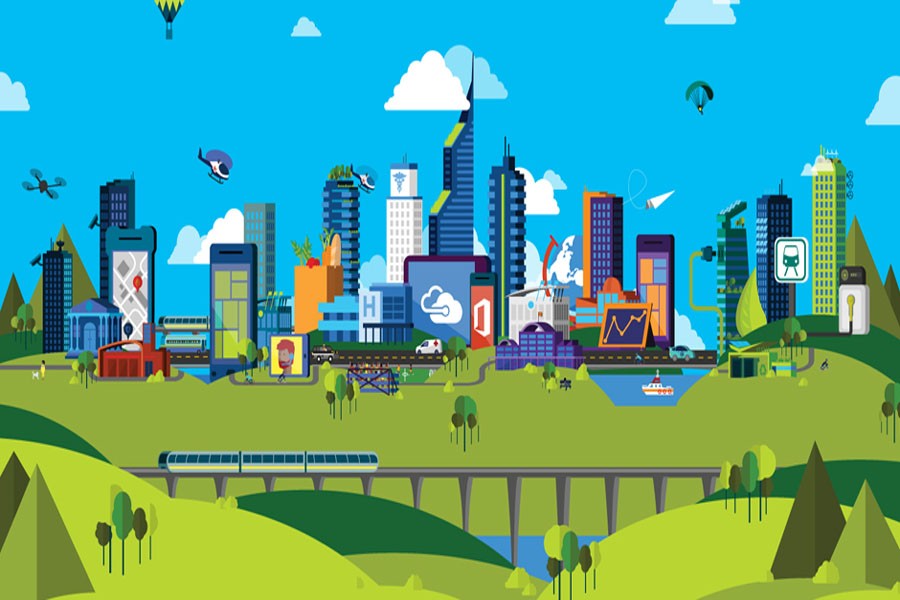The idea of a water-sustainable city is integral to the sustainable development goals (SDGs). On the face of it, the concept may look like a fantasy but the essence of SDGs is different. In principle, the step towards a water-sustainable city is an amalgamation of various aspects of a city's physical features, social affairs and cultural norms.
The following three dimensions of transformation are essential as part of the interventions of the targeted SDG 6:
VISIBLE WATER WITH BLUE AND GREEN LANDSCAPE: Visible water means transparent and quality water integrated with the green design concept for all our development phases when water will be valued and demonstrated by a community's ethical conservation practices. In the process, our city strategies would be based on natural processes of water conservation where all water bodies within the city get a natural flow to their destinations, maintaining enough quality through different uses. This means that our water channels must be allowed to run through the city where green buildings are designed or retrofitted to contain natural processes considering the chances of water-logging condition, discharge of pollutants etc. Particularly, rain water or any surface water bodies should be considered treatable and usable resource. We have to minimise runoff of rain water as much as possible, and substitute it for usual water sources in all purposes. Our landscapes will be designed to be ecologically-sensitive so that impermeable land surface can be converted into a permeable one for infiltrating precipitation into the ground.
In reality, we live in a city with a very poor physical infrastructure where 'green' infrastructure is not much focused, or even bypassed in many development projects. This is due to lack of our awareness and understanding of long-term benefits of a sustainable city. The service components are not properly designed on evaluating the natural processes of ecosystems. In the present context of our city infrastructure, promoting green infrastructure can contribute to making the water bodies visible rather than capturing and controlling nature. The process allows city dwellers to rely on 'local' water resources.
CULTURE OF CONSERVATION PRACTICES: Water is a basic need for human existence on the Earth. In general, it is used for three major purposes of our everyday life-- domestic, agriculture and industry. Among these sectors, household consumption of water is the smallest, but has a great potential impact. A study shows, over half of all accessible water runs off. Recently, household water consumption is considered the largest growing sector with about 80 per cent more consumption expected in the next 25 years. However, an adoption of some strategies and social behaviours can significantly reduce water consumption at home or outside.
The conservation ethics are very important in respect of water consumption practices, which ultimately have positive impacts on conservation of all natural resources including energy. For a water sustainable city, it must be embedded in the natural systems where some essential strategies are: 1) urban slum must be discouraged within the natural system, 2) minimisation of the size of water networks (more zoning systems in water distribution and collection, so that water use decisions will be connected closely), 3) all types of energy use related to water networks are minimised, or conducted through renewable energy resources (e.g. per household level water/natural gas utility bill by 'meter' system, minimising burning of natural gas for purifying water for drinking etc), 4) modifying and using modern devices for toilet (flashing and other behavioural changes), bathroom (less consuming shower, tap, others), washing (less consuming washing equipment, behavioural change in dish and cloth washing), food preparation etc. 5) recovery and reuse can be practised through green building design, city corporation planning, campaigning and citizens' actions.
Water consumption should be linked to local sources of water like rain water or other surface water sources. All sources will have best of use without releasing pollutants into water, which means the quality of water is preserved for different purposes and not wasted. We have to identify the leaking points and system loss of the water distribution channel as it is a part of water conservation practice. A comprehensive household rebate packages on water consumption pattern and award certification for green developments may be promoted at the community level upon meeting the specific criteria.
SHARED RESPONSIBILITY: Since sustainability is achieved in a sector through integration and engaging all beneficiary voices, integration of all citizens' demand in the city planning is essential. The city administration should seek links for collaboration and encourage a wider participation in policy or decision making processes. Ensuring participation not only means delegation of responsibilities, but also the possibility of an integration of various forms of local expertise at each point of the processes.
At the foundation of planning a sustainable city lies a comprehensive change in people's daily activities instead of manipulation of nature. People usually understand that a city's water sustainability is mostly about governance involving people, institutions and rules. But their sense of responsibilities finally influences them to get involved in planning processes. Capacity building and skill development of the communities should be organised on the basis of private-public partnerships.
This process already exists but a scale-up is needed. All stakeholders must be interconnected technologically and rely on digitisation process to access data, share data, support cooperation, integration and contribute to the overall sustainable development.
The writer is Senior Research Associate and sustainability professional at BRAC Research and Evaluation Division


